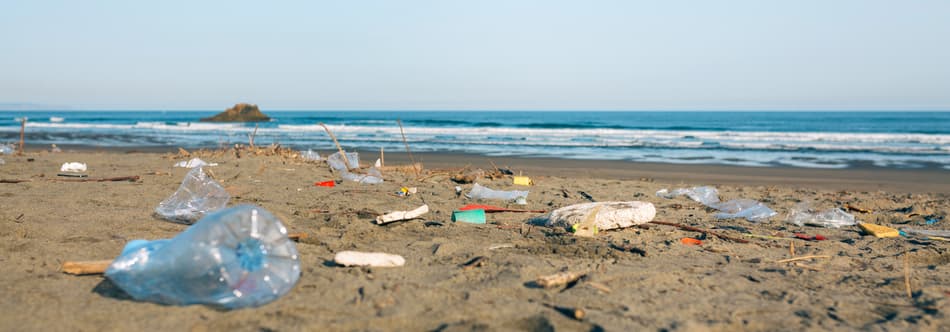
The UN Treaty on Plastic Pollution can drive global waste management solutions - here's how
If current trends continue, the OECD predicts that the amount of global mismanaged waste could skyrocket from 79 million tonnes (22% of all waste) in 2019 to 153 million tonnes (15% of all waste) by 2060. Of that mismanaged waste, 22 million tonnes is plastic entering our environment - a number that could surge to 55 million tonnes by 2060.
These projections are a stark reminder that current global waste management is failing. This is why the first of TOMRA’S 10 recommendations for the UN’s Treaty on Plastic Pollution, released ahead of the 3rd International Negotiation Committee (INC3) Meeting in Nairobi, Kenya, is to:
"Ensure access to efficient and convenient general waste collection for all citizens in all regions as a universal human right. Global access to waste collection is imperative to prevent litter and end illegal dumpsites and open burning."
The UN Treaty on Plastic Pollution has the potential to tackle the plastic pollution crisis on a global scale, by providing a framework for countries to reduce plastic waste and promote the reuse and recycling of plastic materials. TOMRA recognizes that the implementation of widespread waste collection services in all areas could significantly reduce the amount of plastic that is released into the environment.

To bring this vision to life, the UN Treaty on Plastic Pollution should promote a more holistic approach to resource management, ensure adequate financing of waste management systems, and improve administrative capabilities across the board.
Taking a holistic approach to resource management
We cannot solve the plastic pollution crisis by tackling this complex issue in isolation. Success is more likely if we take a more comprehensive approach – finding ways to improve operations, costs, and the environment simultaneously. To enhance waste management, central and local governments must commit to investing in holistic systems that are designed to fit local needs. These systems should make it easy to collect, sort, and process all types of waste.
TOMRA’S Holistic Resource Systems – built on mandated extended producer responsibility policies – integrate deposit return systems for beverage containers, separate collections for certain waste fractions, and mixed waste sorting to recover recyclables prior to disposal. These systems are based on current policies and approaches on both national and regional levels that deal with existing products, materials, and waste flows.
Organizations can reap considerable benefits by adopting this holistic approach because it will enable them to easily respond and adapt to changing needs and local conditions. For example, in areas with no established waste management systems or infrastructure in place (known as "greenfield" areas), organizations can implement cost-effective, low-maintenance, and low-technology systems that can be scaled up as needed. Deposit return systems, in particular, have their own dedicated value chain, meaning they run independently from general waste management systems and do not require municipal funding or high administrative costs.
Financing well-designed waste management systems
To create financially viable waste management systems, the treaty should stimulate the creation of robust and sustainable financing models for waste management and recycling. These models should cover both operational expenses and capital investments for infrastructure and should not depend on grants or project funding. They should be developed through a combination of systems like waste generator or user fees, and extended producer responsibility policies, such as deposit return systems.
In short, extended producer responsibility schemes ensure that producers are held accountable for the plastic products and packaging they place on the market. This means that producers cover the costs of collecting and processing their products and packaging once they reach the end of their lifecycle. When plastic is collected and processed with other materials, producers should also cover a fair and representative portion of those overall costs – when it comes to packaging, an effective extended producer responsibility scheme should extend its coverage beyond plastic to cover other types of waste, such as paper, glass, and metal. This would create a level playing field for all materials and help to avoid any unwanted consequences.
Improving administrative capabilities
The most effective way to manage waste is to create systems that are tailored to the needs of local communities. To do this, it is important to build administrative capabilities within each region, starting with strong leadership, support, and commitment from key stakeholders, such as government officials and politicians.
Ultimately, achieving the best waste management system in any region requires a holistic approach to operations – one that provides a "just transition." This entails engaging citizens and providing high-quality job opportunities to ensure that all communities, workers, and social groups are included in the transition to a circular economy.
Creating effective waste management systems around the world is vital if we are to significantly reduce plastic pollution and safeguard our planet for future generations. In some countries, waste pickers are the driving force behind the majority of recycling efforts. By strengthening waste management, we can provide these individuals with an improved livelihood and enable a just transition in these regions.
Successful examples of reducing plastic waste can be found in India and China, where formal waste management is implemented in an inclusive and non-disruptive manner. Such systems are specifically designed with the intention to address waste not targeted by waste pickers, creating job opportunities and integrating or working alongside the informal collection of recyclables.
TOMRA calls upon governments worldwide to take bold and swift action to combat plastic pollution. We urge them to develop an International Legally Binding Instrument that ensures a circular future where plastic is treated as a valuable resource – one that is kept out of the environment and in circulation at its highest value and best use for as long as possible.
